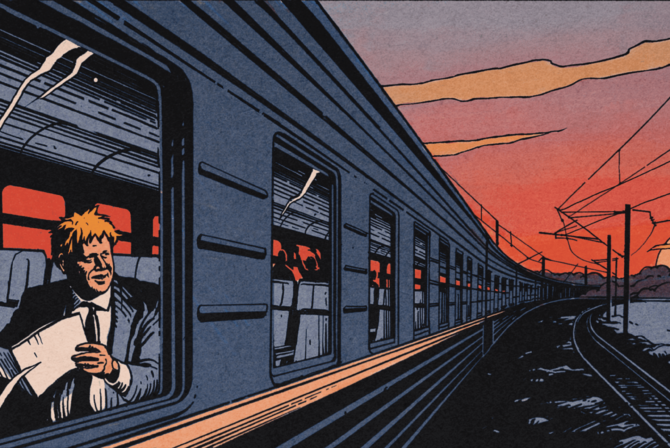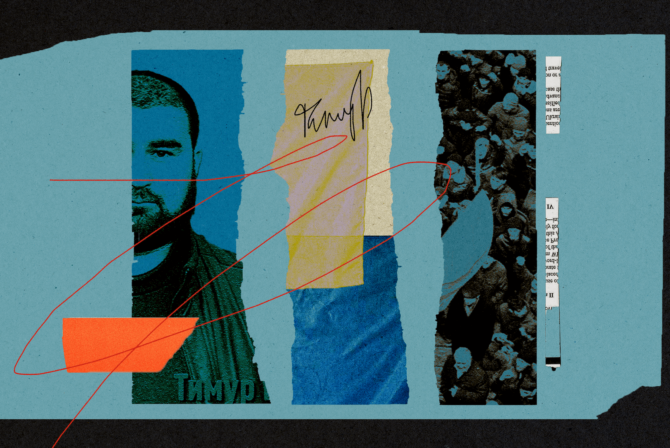The Ukrainians Media is an award-winning independent media company focusing on high-quality, long-form, and visual journalism. Our mission is to foster positive social changes in Ukraine.
This story was created thanks to the support of our readers. Please join The Ukrainians Community on Patreon and help us publish more important and interesting stories.
On January 6, Ukrainian poet Vasyl Stus could have turned 85. In theory, I could hear him read his poetry at literary festivals, ask for a joint selfie, and queue for an autograph in yet another re-edition of his Palimpsests. Yet it never happened—and never will because the poet died in 1985, at 47, imprisoned in a camp in the Russian hinterland. We could have avoided missing each other if Ukraine had not been occupied before 1991. But it had been, so our paths never crossed.
Shortly before and after the start of the Big War, many postmodern Ukrainian authors celebrated their 60th anniversary: Yurii Andrukhovych, Viktor Neborak, Yuriy Izdryk, Oksana Zabuzhko, Oleksandr Irvanets. Their youth (and bold artistic experiments) coincided with perestroika and the first years of Independence.
Perhaps for the first time in the history of Ukrainian literature, there are representatives of all generations in modern literary discourse.
At a literary festival, one can now hear dissident and modernist Ihor Kalynets and the youngest winners of the Smoloskyp Publishing House contest and also discover the literary groups of the 1990s. It seems like a normal situation, yet it is completely untypical for the Ukrainian cultural field if one recalls that only 35 years ago, a Ukrainian poet could die in a Russian prison while any publication of literary experiments was out of the question.
Besides presenting new literature, literary projects in Ukraine often give voice to pieces that otherwise would have no chance of being published and read.
As a teenager, I was fascinated by some authors unknown to me before because their writings were highly recommended. Only later did I learn that these authors could be banned, censored, or even killed by the political regime that prevailed before the collapse of the USSR and my birth.
Such was the case with the poet Hrytsko Chubay (1949-1982): at his tribute events, they accompanied his poems with good music, and his friends recalled incredible stories telling not so much about the regime as the romance of the Lviv underground, poetry, and music. The focus there was on the young genius poet and his swift life. The context came later when the writings inspired me to learn more and seek answers to questions quite obvious to literary critics but only a few readers. Why didn’t they publish his work during his lifetime? Why was there such a long pause in his writing? Why did he die young? Why did the KGB interrogate him?
Literary events and stories from their participants revealed the attitude towards Ukrainian literature as something that can offer a unique experience and personal discovery. This is how From Tychyna to Zhadan, the anthology organized by Ivan Malkovych, has worked, offering a holistic view of 20th-century Ukrainian poetry unadjusted for the Soviet occupation.
Or rather, the contexts are there, but they do not prevent Malkovych from compiling an anthology that offers the reader to take pride in their country’s poetry rather than read a martyrology.
Deep reading of such literature equips one with techniques they can apply independently to describe the space around them, find their place in the world, and self-identify. One of these techniques is telling stories, thereby joining a particular common history.
Edward Said, whose theory of imperialism is now often cited, writes that a nation is a narration. Benedict Anderson writes that a nation is an imagined community. In other words, to identify as part of a community, one needs to tell their own story that will include contexts and thus relate to the stories of other community members sharing the same contexts.
Literature is storytelling that reminds us of the past and allows us to check our community’s variable or permanent features.
Hence talented writers have always been such unwanted residents in the areas where Russia applied its occupation policy. Why? This question will remain regardless of how many times we repeat the answer. A normal mind, inhabited since an early age by the stories of the world around us told in our native language, can answer it based on facts, but based on feelings, the answer will never be acceptable. Writers shouldn’t be killed for writing good literature; this simply should never happen.
After imprisonment or even physical extermination, stories still remain—not all, but many enough to feel the support of our imaginary community’s invisible predecessors during this war.
***
Kyiv is a target declared by Russians, a network of coordinates for launching their missiles, and a landmark location for Moscow’s mythology. Still, it is also a city of everyday life for many Ukrainians, a field of action in the novels by the best Ukrainian authors, and the capital of Ukraine.
As Vasyl Stus called his central book of poetry, the image of palimpsest, or layering, helps to understand the city of Kyiv and feel its past. Most historical buildings changed their purpose dozens of times depending on who ruled the city. And their stories, like the story of the building at number 13A Andriivskyi Descent housing “Mikhail Bulgakov Literary and Memorial Museum,” can be told so differently that the reader would never realize it is about the same landmark.
Anyone looking for a Russian Kyiv will see the house where Bulgakov lived and housed the heroes of his novel The White Guard, who were horrified by the declaration of the Ukrainian state.
On the other hand, those who perceive Kyiv as the Ukrainian capital will see the house of the architect Vasyl Lystovnychyi, where Oleksandr Koshyts, who made the composer Leontovych’s “Shchedryk” famous, once lived.
Writing about one-thousand-year-old Kyiv, which “fancied feeling young again,” Vasyl Stus offers an untypical view of history—not a linear one but a reverse one, from pagan times to the Kyiv of his days. Like a living being, filled with imagery from ancient Rus’ chronicles, Kyiv contemplates itself and how the layering of new eras affects it. And the city can’t handle some of them:
Kyiv coughed asthmatically.
Through the metro’s drafts
the electric trains fearfully rattled,
as a dozen layers of ground,
white from human bones,
horses’ skulls,
and grey ash of funeral pyres,
rippled like the skin
on an angry bull’s neck.
(Winter Trees, 1965)
In Stus’s interpretation, Kyiv of the 1960s falls silent after seeing a pack of pioneers: “ashamed, it bowed its head. It hid itself away—without a peep.” Stus’s poetry is full of such unconventional views on seemingly defined things and abounds with neologisms. With neologisms and unexpected vocabulary, Stus voices the Ukrainian language in a new way. He writes against the background of total Russification, not raising the issue of language capabilities but demonstrating them.
There is a Dictionary of the Poetic Language of Vasyl Stus, from which it is easy to see that an interpretation of Stus’s poetry requires awareness of cultural contexts, a sense of cultural continuity, and knowledge of Ukrainian and European history.
Stus succeeds in what a colonized nation is denied: telling his story and feeling its place among other world narrations. It is another technique offered by Ukrainian literature.
***
Building own mythology, researching own history, and telling own stories is the privilege of the independent. I want to recognize myself in works of art and the stories they tell, to complement them with my life, walking the routes of literary characters, looking for the streets where artists lived, and choosing a drink where my favorite authors did.
Regarding texts about Kyiv, it all boils down to a simple feeling—you, too, are worth a story, and the space around you has been described for you and in your language. It is about not feeling expelled from everything interesting and living your life to the fullest. In fact, this is how sovereignty feels.
I go into a bookstore in Podil to see the newly added shelf with books on Kyiv with my own eyes. Instead of some boring category, the label on the shelf says: “How Can I Not Love You, My Kyiv!” This song they usually play from the loudspeakers at the Kyiv railway station sounds in my head and always means return. On the shelf are prose, poetry, a travel guide, and classic and modern texts welcoming to discover the capital through a story. It’s a simple trick: to read about the city you walk somewhere other than Wikipedia or somehow otherwise than in the news format. But how can we unite V. Domontovych, Vasyl Stus, Oksana Zabuzhko, Valerian Pidmohylny, Maryna Hrymych, Attyla Mohylny, Sofia Andrukhovych, Mykola Vinhranovskyi..?
All these are good pieces of literature marked by self-sufficiency inherent in all the components: style, plot, language, characters, and so on. The feeling of this self-sufficiency is always transmitted to the reader, leaving the empire’s shadow behind and leading out to the sunlight. This is not a major task of good Ukrainian-language literature, but it still performs it.
Bohdana Neborak, editor-in-chief of The Ukrainians online magazine, manager of cultural projects, host of Yet Untitled podcast.
Translated by Stanislav Ostapenko.
The Ukrainians Media is an award-winning independent media company focusing on high-quality, long-form, and visual journalism. Our mission is to foster positive social changes in Ukraine.
This story was created thanks to the support of our readers. Please join The Ukrainians Community on Patreon and help us publish more important and interesting stories.




